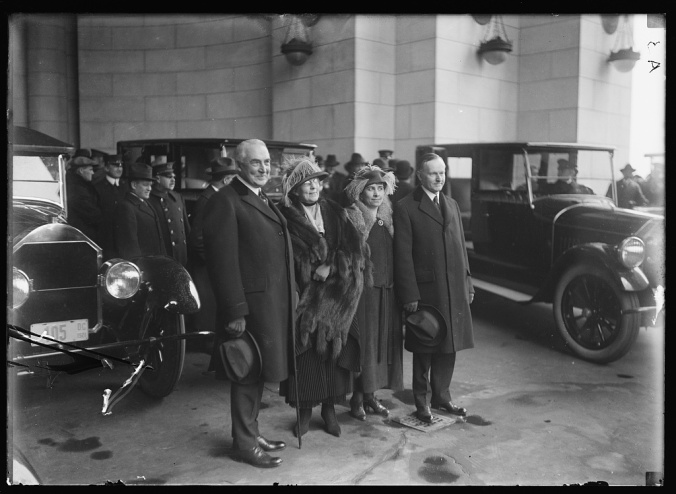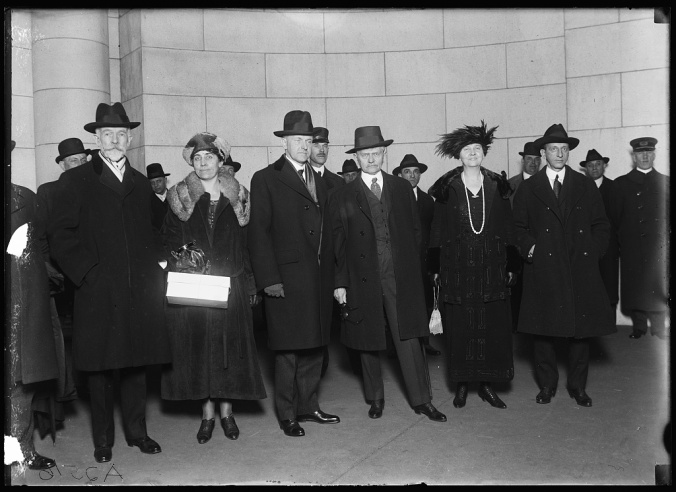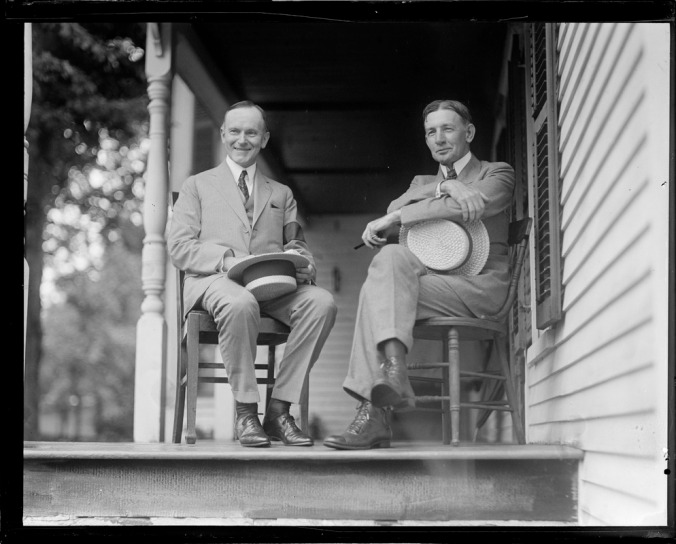
The Hardings & The Coolidges, Union Station, D. C.
The sharp differences between Presidents and their Vice Presidents seems one of the enduring constants in our Republic. There are usually distinct reasons for such differences, especially as elections come and go and campaigns are fought or lost on the strength of an often colorful pairing of personalities. It never fails to reveal a fascinating expression of the popular will in some way, either what it is or what it expects to be. We find that those who attempt some venture at too fast a pace, too far ahead or at odds with the popular will quickly discover how little control they wield over the helm. They are reminded how leadership is much more than an iron grip over destiny and how those at the top are often just as, if not more so, subject to the winds and tides of powers greater than themselves. The contrasts are many: Washington and Adams, Adams and Jefferson, Lincoln and Johnson, Garfield and Arthur, McKinley and Roosevelt, Harding and Coolidge, Coolidge and Dawes, and on the list goes.
There is never-ending appeal in the study of character and personality. We study not just to learn what was at a given point but to learn more about ourselves and what may be around the bend tomorrow. We not only love a good story but hasten to hear more of the manifold variety of human nature and human situations.
How leaders prepare the leadership around them is equally insightful. Some simply do not bother, seeming to think mortality or their own human limitations will never quite catch up and the current Mr. President can and must handle it all himself. Whether from a perception that one is indispensable or the situation, once started, becomes too critical to share the burden, these leaders often discover that their own limitations find them. The Office inescapably tests the quality of the materials that come to it. Some pass and others fail but all are measured. We tend to assume our Presidents (and some Vice Presidents) carry ample egos into office and rarely glimpse the humility that some sincerely bring with them or that others may encounter along the way.
The best leaders do not subscribe to the notion that the Vice President “earn his place,” as if he were being properly prepared for the responsibilities he needs through neglect. Treated like some greenhorn or boot who needs to find things out for himself — the hard way — Presidents are sometimes very unfair to their Vice Presidents. The best leaders do not set so obtuse a tone but never lose sight of the fact that the President was once a “newbie” as well. In fact, most Presidents have never “Presidented” before either. They would do well to remember that in their treatment of others. It comes from a cognizance that if circumstances place us somewhere, we owe it to others who come after us to share what we have learned and make things easier. Bitterness over our own poor treatment can make us callous to helping others. We punish those who come after us when we repeat the mistake inflicted on us. If one stands where I once stood, I can share my road map with him, knowing how lost and uncertain I felt in his place. Even the most talented individuals come to the office inexperienced. The best leaders do not make the road more difficult for those who come after them. Instead, they smooth the path for others. They take up service not self-aggrandizement.
Coolidge never forgot where he started and this improved the caliber of his leadership. It was the same whether the office was President of the state senate or President of the United States. The opportunities that had come to him were not resources to jealously hoard but gifts to generously bestow. Coming to Washington in the spring of 1921, they had one of the best couples on hand, ready to help, even though Thomas and Lois Marshall, the outgoing Vice President and his wife, had not received anything close to the kind help and ample support they would give to the Coolidges. The Marshalls broke the cycle, showing that victims of bad leadership need not replicate the wrong. Vice President Marshall would approach everything with the wry wit and good humor for which he was widely known. It was Marshall who coined many a proverb on the capitol city’s quirks and customs. He deserves greater regard than history remembers, which usually never happens at all. The Coolidges also had the Hardings, the President-elect and First Lady, who certainly had it in their power to be as indifferent as predecessors had almost always been toward the second man on the ticket. It was a landmark departure for Harding to actually include his “Veep” in the Cabinet and intend a wider scope for the office than it had before possessed. This was partly a response to Wilson’s remarkable refusal to include Marshall in the decision-making of the administration but it was no less praiseworthy on Harding’s part.

Greeting the Coolidges at Union Station, 1921. Left to right: Senator Lodge, Grace and Calvin Coolidge, Thomas and Lois Marshall, and Coolidge’s personal secretary, Ted Clark. Photo credit: Library of Congress.
The death of Vice Presidents in office had taken on a kind of morbid tradition all its own, not only because the V. P. was, on occasion, significantly older but the job was the antithesis of a bright and glorious future. It was the most conspicuously thankless office in each new administration. There was no real power solicited and no authority to do much of anything, a humiliating vocation for those who had spent lifetimes in far more potent roles as governors, patronage bosses, Senators, Speakers of the House, committee chairmen, and so forth. Most of the time, few came to visit the Vice President and fewer cared.
With the death of President Harding in the summer of 1923, President Coolidge would succeed him but the office of Vice President would remain vacant for nineteen months, until the inauguration of Vice President Charles G. Dawes in March 1925. It would be the fourteenth time the office had been left vacant, though not for as long a duration as others. Again, we see another striking contrast and yet the same people who voted for Coolidge found in Dawes qualities equally as important and appealing. It was noted at the time that Dawes’ ancestor William, the renowned and more successful rider the night Paul Revere also set out to warn the colonists, later launched a grocery store with his son-in-law, John Coolidge, at Worcester. The genealogical links of the Dawes and Coolidge families found by Mary Spencer Paine in July 1924 became just one of the incredible twists found everywhere in history. It is part of what keeps bringing us back to its stories.
Even after losing his son in the summer of 1924, Coolidge did not merely sit back and depend upon Dawes to campaign for him. Grief had not driven Cal under a rock. He would help his Vice President with the campaign ahead, no doubt just as much in need of what was expected of him as Cal had been on the campaign trail in 1920. Some biographers find Coolidge’s letter to Dawes of August 2, 1924, odd, even perplexing but when kept in the perspective of what these two had faced already, it elucidates a great deal. It is Coolidge being himself and instead of leaving his V. P. to drift alone, he brings the brilliant businessman, retired General, and former Budget Bureau chief into his confidence. His thoughtfulness shines through the letter. His openness will no doubt surprise many who think Coolidge ever only said two words all his life. Cal, without arrogance or condescension, draws deeply from his own practical experience in campaigns, knowing it is turf, for all of Dawes’ abilities, that remains foreign and unfamiliar to him.
The White House
Washington
August 2, 1924
My dear General:
Thinking you may have the same difficulty in writing a speech of acceptance that I had four years ago, I am going to venture to try to help you.
The more simple you can keep it, the better you will like it. You have for your guide, of course, the Party’s platform, and you might get some suggestions out of my message to the Congress and the speeches that I have made since that time. If you keep as much as you can to an expression of general principles, rather than attempting to go into particular details of legislation, you will save yourself from a great deal of annoying criticism. More people will agree with you if you say we ought to have protection, than if you begin to discuss various schedules. More people will favor opposition to high surtaxes, than the adherence to specific rates.
I know how irksome it is to attempt to restate what others have said, instead of having perfect freedom to branch out in any direction you might wish. But that is the penalty we have to pay for running in pairs. Should you think that I could possibly be of any help, do not fail to run down here any time, or communicate with me in other ways, always keeping in mind that my telegrams and telephones are public property.
It may interest you to know that I was much pleased to learn the other day that I am kin to Manasseh Cutler, through the Rice family, and therefore kin to you. We are both kin to John Quincy Adams.
With kindest regards to you and Mrs. Dawes, I am
Very truly yours,
Calvin Coolidge
P. S. Whenever you go anywhere, take Mrs. Dawes along.
Simultaneously, Dawes would be himself as well and despite a few rocky patches ahead would complement the ticket well, serve faithfully, and see things through to the finish line. They demonstrated, even with their divergent styles, the steady competence that brought both men together in service to the nation for a time.

General Dawes visiting President Coolidge at the Homestead, Plymouth Notch, August 1924.